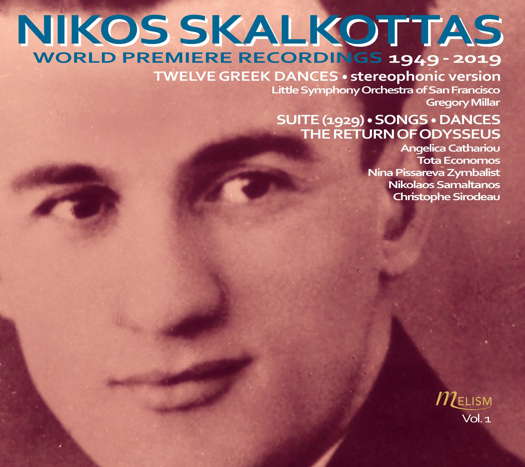 ASK ALICE: Weekly, from 2003 until 2016/17, Alice McVeigh took on the role of classical music's agony aunt to answer questions on a surprising variety of subjects.
ASK ALICE: Weekly, from 2003 until 2016/17, Alice McVeigh took on the role of classical music's agony aunt to answer questions on a surprising variety of subjects.

Undoubted Historical Importance
PAUL SARCICH listens to
music by Nikos Skalkottas
'... Skalkottas is no slave of Schoenberg - he has his own take on Schoenberg's methods and one could not confuse the two.'
Name a Greek composer. Well, after Xenakis and Theodorakis, those of us of a certain age might conjure up Nikos Skalkottas (1904-1949), principally known for his sets of Greek Dances - founded in folk music, and showing the nationalistic side of this composer. But more than being a mere folkloricist, he had a thoroughly modernist side, from his studies in Germany with the likes of Kurt Weill, Janach and Schoenberg. The critic Hans Keller ranked him among the four S's of modern music, the others being Schoenberg, Stravinsky and Shostakovich. Few would make that grouping today, but at one time his importance to modernism was so acknowledged.
However, fleeing Berlin in 1933 from the rising Nazi tide, he left behind over seventy works, most of which were lost. Coupled with his premature death at the age of forty-five, this means we have been robbed of much of his output. This disc, consisting of both historical and modern recordings, goes some way to restoring a view of what was and what might have been.
It also means that at times we have only part works available, or works written originally for one format but presented here in another. Such a work is the Violin Suite from 1929, originally for soloist and small orchestra, but this was lost and what we hear is the violin and piano version, not discovered until 2010 in the Buffalo University archives. Not only that, but the piano part for the (later added) fifth movement is missing, so we are given only the violin part.
The first movement sets the modernist agenda, but Skalkottas is no slave of Schoenberg - he has his own take on Schoenberg's methods and one could not confuse the two. The warmer, more lyrical second movement is perhaps more user-friendly, in two main sections it has a poised beauty to it, the ideas being not difficult to follow. The jumpier allegretto third movement exploits both instruments to the full, and the fourth, a sadder, more heart-rending piece, pushes us towards a sense almost of grief.
Listen — Skalkottas: Andante sostenuto (Violin Suite)
(track 4, 1:03-1:46) © 2019 Melism :
By this time we have a real sense that Skalkottas is at heart a dramatic composer. Parts of the fifth movement stand up quite well as unaccompanied violin writing, but it would surely be more startling with the missing piano part there.
Violinist Nina Pissareva Zymbalist and pianist Nikolaos Samaltanos are obviously committed advocates for the music, Zymbalist being a powerful violinist who is unafraid to go for the grit where necessary. The recording is from 2019 so the sound is excellent, although a few patches of breathing noise can be heard.
Three songs follow, with Samaltanos accompanying mezzo Angelica Cathariou, who delivers with clarity and control. On the Beach has an Eastern European aura - it could almost be Russian (à la composers like Gavrilin) - and although it starts in folk-mode Skalkottas moves the harmonic language on to make something of his own. The Music has a tilt to Kurt Weill, but Once Upon a Time is even more expressionist, the very active piano behind the much slower pace of the voice creating a disturbing atmosphere.
Listen — Skalkottas: Once Upon a Time
(track 8, 0:19-0:54) © 2019 Melism :
Quite the most demanding (on performers and listeners alike) on the disc is The Return of Odysseus, an overture for a projected opera but now a concert piece. Written for 'Great Orchestra' (which proved to be too big for Athens in 1949, but given in London in 1969 by Doráti and the LSO), the version recorded here is the two piano reduction by Alex Thurneissen. Recorded in 1994 and remastered in 2018, we can count it a modern recording.
Opening with almost impressionistic textures, the writing rapidly becomes diffuse and busy. This must have been, for its day, an uncompromising modernism. (Certainly Skalkottas was not well-received in Athens after his return from Germany.) It seems infused with the German Expressionism that Skalkottas would have been surrounded by in 1920s Berlin, even though it was written between 1944 and 1949.
The density extends to the second section, where despite some lyrical melodic lines forcing their way through, much of it seems overwhelming. At this point I started to pine for orchestral colours which would delineate the various parts and sound masses. This section finishes with chiming, chattering writing in which too many ideas seem to be competing.
Listen — Skalkottas: Allegro molto vivace (The Return of Odysseus)
(track 10, 6:18-6:57) © 2019 Melism :
A complex fugue lies at the heart of the third section, frantically busy for the most part - follow the lines if you can!
Listen — Skalkottas: Fugue (The Return of Odysseus)
(track 11, 0:01-0:46) © 2019 Melism :
It is the sort of thing duo pianists would take on as a stand-alone showpiece, especially with the colossal final bars. The franticness continues in the fourth section. (If this was to be an opera, one can only imagine the stage action at this point!) It is a heady mix of melodic fragments, cluster writing and general busyness, although Skalkottas never stays with one thing for terribly long before changing course dramatically. The final section is a presto coda, keeping up the intensity to a crashing ending.
Samaltanos and his partner Christophe Sirodeau rise admirably to the challenge of this fiendishly difficult score, but in the two piano format it is difficult not to hear a lot of this as over-written, simply because it is all piano sound, and without the orchestral palette of colours, ideas quickly become tangled up in each other.
And so to the Twelve Greek Dances, Skalkottas' most known concert work (although he wrote a total of thirty-six). This recording dates from 1957 and has been remastered into stereo. It is still a close, compressed sound but mercifully free of artificial stereo gimmickry. Recorded by the Little Symphony Orchestra of San Franciso (which smacks of being a pick-up band, but produces decent playing even so) under Gregory Millar (Grigorios Manoussos), this cannot sound anything but 'historical' or compete with more modern recordings.
Listen — Skalkottas: Peloponnisiakos I (Twelve Greek Dances)
(track 14, 0:25-1:24) © 2019 Melism :
However, the dances themselves, and Skalkottas' treatment of them, have enough variety and Adriatic colour to form a perennially popular suite. They are driven by the dance rhythms of Greek music, with characteristic woodwind and string work involving slides, ornaments, note-bending and the like in imitation of a folk-singer's voice. Not all are simple renderings, Skalkottas bringing his own modernistic touches and some non-standard orchestration to the difficult art of transmuting folk material into art music. Surprisingly few though feature the 5/8 or 7/8 metres we associate with Greek dance.
Listen — Skalkottas: Nissiotikos (Twelve Greek Dances)
(track 18, 0:01-0:48) © 2019 Melism :
Two dances performed on piano by Tota Economos finish the album: this is the earliest recording, dating from 1949. There is surface noise but a surprisingly good piano sound.
Listen — Skalkottas: Ipirotikos I (Twelve Greek Dances)
(track 27, 1:24-1:56) © 2019 Melism :
There is undoubted historical importance in this enterprise, and Skalkottas scholars and completists I'm sure will be interested. (Given this disc is marked Vol 1, it seems there are more historical recordings on the way.) For the general musical public I'm not so sure - given that the BIS label has twenty releases of Skalkottas' music in modern recordings, that would seem to be a more obvious draw. But those determined to champion Skalkottas, document his work and revive a composer of importance in the development of modern music are doing a fine job. The booklet contains photographs of various memorabilia related to the works, and there are informative notes in French and English by Samaltanos.
Copyright © 11 May 2019
Paul Sarcich,
London UK

CD INFORMATION: NIKOS SKALKOTTAS WORLD PREMIERE RECORDINGS
FURTHER INFORMATION: NIKOS SKALKOTTAS




